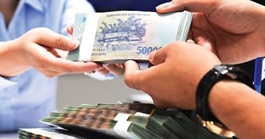Lending rates expected to be stable thanks to State support package
Lending rates expected to be stable thanks to State support package
Lending interest rates in the remaining months of this year will stay relatively stable to help firms recover production after the pandemic.

This is thanks to the 2-per-cent interest rate support package and banks’ measures to cut input costs, according to Dr Hoang Van Cuong, vice president of the National Economics University.
The Government in May this year issued Decree No. 31/2022/ND-CP on interest rate support from the State budget for loans of enterprises.
Recently, Saigon-Hanoi Commercial Joint Stock Bank (SHB) has announced it would spend VND710 billion to directly reduce loan interest rates by 2 per cent per year for qualified firms, cooperatives and household customers according to Decree 31.
Previously, Joint Stock Commercial Bank for Foreign Trade of Vietnam (Vietcombank), Vietnam Bank for Agriculture and Rural Development (Agribank) and Orient Commercial Joint Stock Bank (OCB) were the first banks to announce the implementation of the interest rate support package.
According to Cuong, though firms are looking forward to the 2-per-cent interest rate support package to get cheap capital for their production and business, in fact, the number of firms that have been able to access the package and newly disbursed loans under the package have so far been restricted.
Cuong attributed the restriction to the banks’ credit room. Most banks have so far used up all credit quota granted by the State Bank of Vietnam so that they cannot expand credit despite firms’ capital shortage.
As Viet Nam’s inflation in the first half of this year was well controlled at 2.24 per cent and the amount of money supplied to the economy over the past years was not much, Cuong said it is necessary to expand the credit quota for banks so that they can boost lending and firms can access the interest support package.
The 2 per cent interest rate support package therefore can really aid firms and have a positive impact on the economy, said.
According to Cuong, besides the package, banks have been also forced to take measures to save input costs and better manage loans to reduce risk provisions, so as to cut lending interest rates as directed by the SBV.
Currently, some banks are also applying preferential interest rates of about 6.7-8.1 per cent per year for 60-180 month business loans.
At Bank for Investment and Development of Vietnam (BIDV), for example, a preferential interest rate of 6.7-7.5 per cent per year is listed for business loans while the rate at Joint Stock Commercial Bank for Industry and Trade of Vietnam (VietinBank), Joint Stock Commercial Bank for Foreign Trade of Vietnam (Vietcombank) and Tien Phong Commercial Joint Stock Bank (TPBank) is 7-8.1 per cent, 7.5 per cent and 6.8 per cent per year, respectively.
The preferential rates will be applied in the first 6, 12 and 24 months, or even up to 7-10 years, depending on each credit package of each bank. At the end of the preferential period, the interest rate will be floated according to the market’s interest rates.
Saigon Securities Incorporation (SSI) forecast the SBV will expand the credit quota for some banks in the third quarter of this year and the move will cause the deposit interest rate to rise by 50-70 basis points.
As for the whole year of 2022, SSI expected the deposit interest rates to increase by 1-1.5 percentage points against 2021 while lending interest rates for new disbursements will be up 1-2 per cent.
In 2023, SSI forecast interest rates will be different in the first half and the second half of the year. Accordingly, the rates will remain under upward pressure in the first half of 2023 as the consumer price index (CPI) is estimated at 5.2 per cent. The rates then will likely cool down in the second half of 2023 when inflationary pressures gradually ease with CPI estimated at 3.4 per cent.
For the whole of 2023, the rates are expected to increase by about 70-80 basis points, reaching the rates before the pandemic.

























